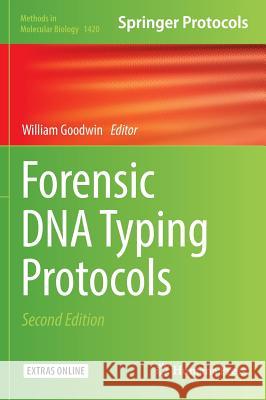Forensic DNA Typing Protocols » książka



Forensic DNA Typing Protocols
ISBN-13: 9781493935956 / Angielski / Twarda / 2016 / 298 str.
Forensic DNA Typing Protocols
ISBN-13: 9781493935956 / Angielski / Twarda / 2016 / 298 str.
(netto: 613,40 VAT: 5%)
Najniższa cena z 30 dni: 616,85
ok. 22 dni roboczych.
Darmowa dostawa!
Preceded by Forensic DNA typing protocols / edited by Angel Carracedo. 2005.
Wydanie ilustrowane
"This is an instructional book that raises awareness of the technology available in genetic forensic sciences. ... The book is written in a way that is easy to understand for advanced professionals as well as beginners. Anyone wanting to understand the technology involved in forensic DNA analysis would benefit from this unique book. ... The value of this book lies in the simple and logical way it presents complex information in forensic medicine." (Luis F. Escobar, Doody's Book Reviews, November, 2016)
1. Collection of Samples for DNA Analysis
Roland A.H. van Oorschot, Timothy J. Verdon, and Kaye N. Ballantyne
2. Body Fluid Identification Using mRNA Profiling
Amy D. Roeder and Cordula Haas
3. mRNA Profiling for Vaginal Fluid and Menstrual Blood Identification
Joanna Jakubowska, Agnieszka Maciejewska, and Ryszard Pawlowski
4. Preservation of and DNA Extraction from Muscle Tissue
Dennis McNevin
5. DNA Extraction: Organic and Solid-Phase
Wafa Ibrahim
6. Extraction of DNA from Skeletal Remains
Suni M. Edson and Timothy P. McMahon
7. Extraction of DNA from Human Skeletal Material
Irena Zupanič Pajnič
8. The Development and Use of Internal Amplification Controls (IACs) with DNA Profiling Kits for Forensic DNA Analysis
Nathalie Zahra and William Goodwin
9. NucleoSpin ®XS Columns for DNA Concentration and Clean-Up
William R. Hudlow
10. Purification of PCR Products to Improve STR Profiles
Amy D. Roeder
11. Analysis of 30 Biallelic INDEL Markers Using the Investigator DIPplex ® Kit
Majid Bashir and Nur Haliza Bt Hassan
12. Analysis of Mitochondrial Control Region Using Sanger Sequencing
David Ballard
13. Whole Human Mitochondrial DNA Sequencing
Igor V. Ovchinnikov, Mathew J. Malek, Katelyn Kjelland, and Kenneth Drees
14. In-Solution Hybridization for the Targeted Enrichment of the Whole Mitchondrial Genome
B. Bekaert, R. Ellerington, L. Van den Abbeele, and R. Decorte
15. Enhanced DNA Profiling of the Semen Donor in Late Reported Sexual Assaults: Use of Y-Chromosome Targeted Pre-Amplification and Next Generation Y-STR Amplification Systems
Erin K. Hanson and Jack Ballantyne
16. Analysis of Rapidly Mutating Y Chromosome Short Tandem Repeats (RM Y STRs)
Sibte Hadi
17. A Practical Guide to the HIrisPlex System: Simultaneous Prediction of Eye and Hair Color from DNA
Susan Walsh and Manfred Kayser
18. Inference of Ancestry in Forensic Analysis I: Autosomal Ancestry – Informative Marker Sets
Chris Phillips, Carla Santos, Manuel Fondevilla, Ángel Carracedo, and Maria Victoria Lareu
19. Inference of Ancestry in Forensic Analysis II: Analysis of Genetic Data
Carla Santos, Chris Phillips, A. Gomez-Tato, J. Alvarez-Dios, Ángel Carracedo, Maria Victoria Lareu
20. Species Determination: The Role and Use of the Cytochrome b Gene
Adrian Linacre and James Chun-I Lee
This volume presents a series of protocols and methods, some of which are not widely used by researchers/practitioners, and will aid in the execution of different laboratory techniques. Forensic DNA Typing Protocols, Second Edition is arranged into a series of related chapters. Chapter 1-3 examines two different aspects of RNA analysis for body fluid identification. Chapters 4-7 focuses on the storage of biological materials and the extraction of DNA from hard tissues. Chapters 8-10 present methods for monitoring the quality of DNA extracts, and steps to aid in the purification of DNA. Chapters 11-16 talk about methods on non-standard markers, such as INDELs, Y chromosome STRs, and mitochondrial DNA. Detailed procedures and data analysis for phenotypes and ancestry are explored in Chapter 17-19. The last chapter (20) looks at the application of DNA typing to the identification of non-human material to species level. Written in the highly successful Methods in Molecular Biology series format, chapters include introductions to their respective topics, lists of the necessary materials and reagents, step-by-step, readily reproducible laboratory protocols, and tips on troubleshooting and avoiding known pitfalls.
Practical and thorough, Forensic DNA Typing Protocols, Second Edition, is a valuable resource for forensic specialists, researchers, and anyone interested in the field of forensic science.
1997-2026 DolnySlask.com Agencja Internetowa
KrainaKsiazek.PL - Księgarnia Internetowa









